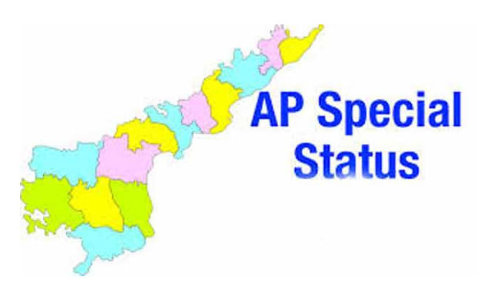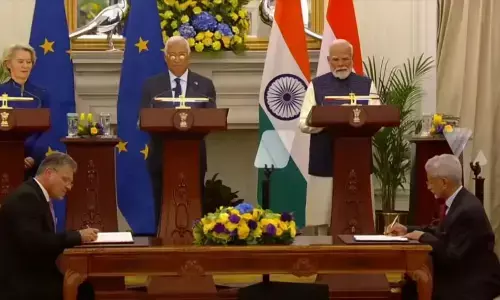Finances of SCS States vis-à-vis non SCS States

The objective of this article is to examine the finances of State governments enjoying the Special Category Status SCS and those that are not having it or denied deliberately There has been a demand from States like Andhra Pradesh, Goa, Bihar, Odisha and many others for the grant of this status, in view of the purported advantages and benefits
The objective of this article is to examine the finances of State governments enjoying the Special Category Status (SCS) and those that are not having it or denied deliberately. There has been a demand from States like Andhra Pradesh, Goa, Bihar, Odisha and many others for the grant of this status, in view of the purported advantages and benefits. As things stand as of now, any State enjoying the SCS is said to have the special favour in terms of the following: (1) Concessions in Excise Duty (2) Concessions in Taxes (3) Central assistance on a priority basis and (4) Sanction of grants to the extent of 90 per cent in the externally aided projects.
More importantly, the Plan expenditure is divided in the ratio of 30:70 between the States enjoying the SCS and those that are not. Further, in the case of the Centrally-Sponsored Schemes (CSS), SCS States get 90 per cent of the assistance as grant and 10 per cent as loan. For non-SCS States, direct grant is limited to 30 per cent and the remaining 70 per cent is treated as loan. It is for these reasons, there has been a constant demand from the States to the Centre to concede to their request.
In the case of States like Andhra Pradesh, it has also turned out to be emotional and election agenda. The intriguing question is whether the purported advantage has really occurred to the States enjoying the SCS vis-à-vis those that are denied of the same. For carrying out this analysis, the data of the Reserve Bank of India is relied upon.
As per the data of the bank, there are 11 States enjoying the SCS, consisting of Arunachal Pradesh, Assam, Himachal Pradesh, Jammu & Kashmir, Manipur, Meghalaya, Mizoram, Nagaland, Sikkim, Tripura and Uttarakhand. The total revenue receipts of these eleven States during 2017-18 (Budget estimates) were estimated to be Rs 2622.7 billion (10.5 per cent) as against the revenue receipts of eighteen non-SCS States amounting to Rs 22,405.6 billion (89.5 per cent); leaving a deficit of Rs 211.5 billion for SCS category of States and a positive revenue surplus of Rs 276.0 billion for Non SCS States. The three SCS States that are having significant revenues (as compared to Non SCS States) are Assam, J&K and Himachal Pradesh.
The point to be noted is that all the eleven States enjoying the SCS, are suffering from deficits on and off during the past five years. The logical conclusion is that If the SCS States are really able to attract investments, the same shall be reflected in the tax revenues generated. Viewed from this point of view, the thin tax revenues of these three States for the year 2015-16 are: Assam (29.1 per cent). Himachal Pradesh (25.9 per cent) and J&K (19.6 per cent). These shares are in fact much less, when compared to the States in the Non-SCS Category. Therefore, the assumption that States enjoying the Special Category Status are able to attract higher investment is not truly supported by the data available.
Further the growth story of these States is also not impressive either. The growth in the real per capita State Domestic Product between 2005 and 2015 hovered around 4-5 per cent only; in comparison to the growth recorded by other Non SCS States higher than 6 per cent.Secondly, there is the argument that Central transfer of funds to these States is on a priority basis, hence they definitely stand to gain. These transfers are in the nature of devolution of (1) State share in Central taxes (ii) Grants from the Centre towards States Plan Schemes, Central Plan Schemes, Centrally Sponsored Schemes, Special Plan Schemes and Non-Plan Grants and (iii) Plan and non-plan loans.
This devolution is carried out on the basis of the recommendations of the Finance Commission. The Fourteenth Finance Commission (FFC) which recommended devolution of resources between Centre and States (for the period 1.4.2015 to 31.3.2010) recommended a significant hike in the devolution of resources to States from 32 per cent to 42 per cent, luring the Central government to remark that there is no much difference between the States enjoying SCS and those that are not. And hence, it does not wish to accord SCS to any new State and more so; it would phase out the continuation of the SCS in due course.
The mess is continued, because the Centre has not dared to repeal the Special Articles like 370 and 371 which are according SCS to the States. Nor is there clarity provided by the Centre on the allocation of funds between the two category of States in respect of Centrally Sponsored Schemes (CSS). It appears that it is the wish of the Centre to make States to roam round with begging bowl.
Analysed from this point of view, attempt has been made to compare the position before and after the recommendations of the FFC. During the year 2014-15, the gross transfer of resources to all the States stood at Rs 6.805.2 billion. The same got enhanced to Rs 8,446.0 billion in 2015-16 and Rs 10,748.9 billion in 2016-17 (Budget Estimates). A significant jump by about 58 per cent. The intriguing question is whether there has been special consideration to the States under SCS Category. Data are available for three years viz., 2016-17 (Actuals), 2017-18 (Revised Estimates) and 2018-19 (Budget Estimates).
The gross devolution in these three years stood at Rs 9,817.1 billion, Rs12,379.1 billion and Rs14,178.3 billion respectively. Of these allocations, SCS States got 14.9 percent, 14.4 per cent and 15.1 per cent respectively for the above three years. Of the eleven States, only three States viz, Assam, (Rs 544.10 billion), Himachal Pradesh (Rs 202.4 billion) and J&K (Rs473.4 billion for 2018-19 (Budget Estimates) are destined to receive a major chunk of the assistance to the extent of about 57.0 per cent.
All other eight States included under SCS are getting the remaining 43.0 percent only. The amount devolved on these States is higher than the bigger States like Gujarat, Punjab, Kerala, Chhattisgarh and Haryana. On this account, the demand for SCS seems justified.Thirdly, the development expenditure of the States enjoying SCS stood at Rs 1285.9 billion for 2015-16, Rs 2890.2 billion for 2016-17 and Rs 2065.1 billion for 2017-18. This works out to about 9.34 per cent on an average for the above three years. Viewed individually, the development expenditure of Assam, Himachal Pradesh and J&K is much higher than that of the States like Punjab, Goa and Chhattisgarh.
Same observation is also true in case of non-development expenditure. It is for these and many other reasons like the special allocations for backward regions, hilly zones, Left wing extremism affected areas, and disaster response, States under Non-SCS category are craving for priority treatment. Under these circumstances, it is high time that Centre clears the dust by requesting the Fifteenth Finance Commission to address this issue separately and draw out the future course of action.
(The writer is former VC, ANU & presently Director, SEA Group of Institutions, Bengaluru)

















